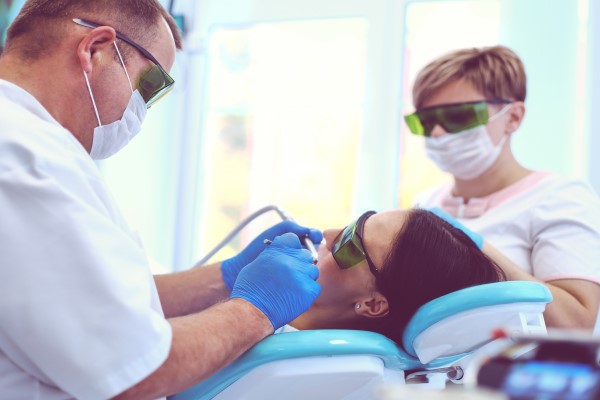Reasons a Dentist Would Recommend a Deep Cleaning

Your dentist might recommend a deep cleaning if you have been diagnosed with periodontal disease. Commonly known as gum disease, this condition affects about half of the people in the United States by the age of 45. Depending on how early the condition is detected, it can be reversed, but sometimes it may only be managed with routine deep dental cleanings. Also known as root scaling and planing, the procedure involves removing plaque and tartar from teeth surfaces and their roots. Let us take a look at the gum disease stages in which a deep cleaning can help you.
Figuring out if you need deep cleaning
A dentist might recommend deep cleaning teeth after performing a comprehensive periodic evaluation. This thorough examination of a patient’s gum tissues involves inserting a probe into the patient’s gum pockets. Healthy gum pockets should be no deeper than one to three millimeters. Any more than that might be a sign of gum disease. Now, let us review some of the reasons that a dentist might recommend deep cleaning or root scaling and planing.
1. To reverse gingivitis
The first stage of gum disease, a.k.a. gingivitis, can be reversed with improved oral hygiene and regular teeth cleaning or, in a more serious case, scaling and root planning (deep cleaning). Gingivitis is an inflammation of the gum tissue caused by bacteria that penetrate the gums and irritate them. Common signs and symptoms of gingivitis are:
- Bleeding gums
- Swollen gums
- Red, irritated gums
- Painful or sensitive gums
If the patient does not improve their oral care habits, the gingivitis will not only keep coming back but can progress into the advanced stage of gum disease, periodontitis. At this point, the disease cannot be reversed, only treated.
2. To prevent periodontitis
Periodontitis is inflammation of the tooth-supporting structures. It can be acute (rapid onset) or chronic (slow onset). Acute periodontitis often results from a bacterial infection; chronic periodontitis may be caused by poor oral hygiene, smoking, and certain medical conditions, such as diabetes.
There are many signs and symptoms of a periodontic infection, including:
- Persistent redness or bleeding in the gum tissue
- Persistent bad breath
- Loose teeth that cause problems while brushing or eating
It is too late to reverse gum disease at this stage, but it can be managed with routine root scaling and planing appointments. The procedure helps clean out bacteria in gum pockets that lead to the chronic inflammation of gum tissues associated with periodontitis. Performing deep cleaning on patients with periodontitis often helps them avoid more complicated treatments used to manage gum disease, like bone grafts, and it can prevent tooth loss.
The process
The regular teeth cleaning procedure involves removing tartar and plaque from teeth surfaces and below the gums. However, deep cleanings go further than that. During the treatment, the patient’s gum tissues are pulled back so the roots of their teeth can be carefully cleaned with specialized tools. The dentist will first scrape away any evidence of plaque, tartar, and bacteria from the enamel surface of the patient’s teeth with an ultrasonic toothbrush. The dentist will then continue the procedure by polishing the roots to smooth out any rough spots. This makes it more difficult for bacteria to accumulate in these areas. It also gives the patient’s gum tissues a smoother surface to attach to, which helps eliminate gum pockets. Medication might be applied to teeth roots to kill any bacteria there.
The procedure can take up to two hours to complete and is usually broken into multiple sessions. Patients are injected with a local anesthetic at the start of their treatment so they are numb and do not feel pain as the dentist works. The conventional way of performing deep cleanings involves using metal tools, but it can now be done with a laser. Often, patients prefer laser deep cleanings because they are less invasive than the traditional approach and lead to less discomfort, swelling, and bleeding.
Protect your teeth against gum disease
In addition to an improved at-home oral hygiene routine, proper care from the dentist can help you reverse the signs and symptoms of gingivitis and manage those of periodontitis. The deep cleaning will remove plaque and tartar buildup on your teeth and reduce the inflammation-causing bacteria in your gums. If you have any questions about periodontal disease or would like more information about our services, give us a call or visit our Tucson clinic to set up an appointment with our dentist.
Request an appointment here: https://www.tanqueverdedental.com or call Oro Valley Family Dentistry at (520) 833-5261 for an appointment in our Tucson office.
Check out what others are saying about our dental services on Yelp: Dental Cleaning and Examinations in Tucson, AZ.
Related Posts
Patients often get dental exams at dental practice visits. Knowing what to expect from one can help the visit go smoother. That way, the patient can make a more informed decision. It also reduces potential anxiety about the visit. Keep reading to learn more about getting an exam.Each exam differs because the dentist might have…
Looking for information on preventive dentistry? Read on to learn more. A good preventive dentist can save you money on significant tooth problems, pain, and costly treatments in the future. All treatments or procedures that prevent tooth decay, tooth damage, and gum disease fall under preventive dentistry. Fortunately, when preventive dentistry is incorporated into daily…
Fluoride treatments are very important in preventative dental care. Every patient wants their dentist to provide them with all the necessary tools to keep their smile bright and white. You go to the dentist twice a year as recommended and brush and floss your teeth regularly.Doing your part in your oral care routine only goes…
Preventative dental care is an important necessity when it comes to taking care of your teeth and gums. Your dentist is your primary defense in dental health. Early detection and treatment of any oral issue are vital in keeping your original teeth looking healthy and staying strong the longest.Be sure to schedule a dental checkup…


